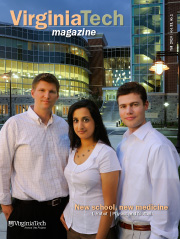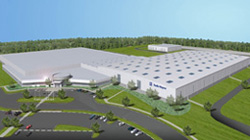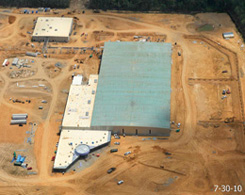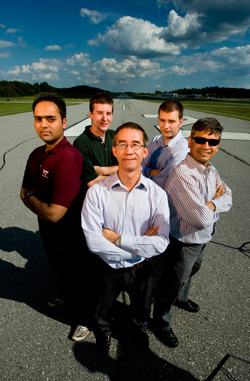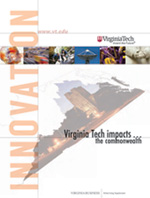 |
|
||||||
|
|
||||||||||||||||||||||||||||||||||||||||||||||||||||||||||||||||||||||||||||||||||||||||||||||||||||||||||||||||||||||||||||||||||||||||||||||||||||
|
Helping Virginia take flight
by DENISE YOUNG
Through a collaborative effort that includes partners from Virginia Tech, the University of Virginia (U.Va.), the Virginia Community College System (VCCS), and state and regional governments, a Rolls-Royce jet-engine plant, located on a 1,000-acre site in Prince George County, Va., is set to open in 2011. The factory will employ 140 people initially, with some 500 employees expected as site development continues. The facility is the fruit of a multifaceted and well-wrought team effort. In 2007, Virginia faced stiff competition as one of eight states vying to land the Rolls-Royce plant. Virginia Tech, U.Va., and VCCS were on board from day one, offering the company the benefits of faculty research expertise and the ability to educate a skilled workforce. The company would go on to forge a strong bond with VCCS, particularly John Tyler Community College in Prince George, to provide worker training, especially in advanced manufacturing. A number of factors led to the company's decision to build the plant in Virginia, said Brian Warner, Rolls-Royce lead for the Commonwealth Center for Advanced Manufacturing (CCAM), a joint research center to be built adjacent to the Rolls-Royce facility and staffed by Tech and U.Va. researchers. The commonwealth's quality of life, strong infrastructure, innovative approach to research and education, commitment to workforce development through the community college system, and economic incentives all played a role in the decision. The greatest instrument of democracy Thomas Jefferson once said, "I look to the diffusion of light and education as the resource to be relied on for ameliorating the condition, promoting the virtue, and advancing the happiness of man." Nowhere is the Jeffersonian ideal of education more vibrantly realized than in Virginia. As the senior land-grant university in the state, Virginia Tech is fulfilling a role it has played since the school first opened its doors. "It's a 21st-century definition of what we're doing, but this project is a reflection of our historic mission of helping to embrace society's problems and helping to provide solutions," said Virginia Tech President Charles W. Steger. "The Rolls-Royce project is a great example of that commitment," agreed Virginia Tech Vice President of Outreach and International Affairs John Dooley. "This project will certainly engage the scientists at Virginia Tech around the business interests of Rolls-Royce and their suppliers. Through this partnership, we will develop a new generation of technologies that will be used in Rolls-Royce equipment." Virginia Tech isn't alone in its ongoing efforts. Universities and community colleges throughout the state also strive to make Virginia a prosperous place to work and live. Barry Johnson, associate dean for research in U.Va.'s School of Engineering and Applied Science, said that despite the oft-publicized rivalry between Tech and U.Va., the two universities work together constantly to help the commonwealth and society as a whole. "A lot of people tease us about being competitors all the time, but the reality is that we frequently have faculty teaming up on research projects. [Collaboration] happens every day at the faculty level. There's a natural relationship there. We have Virginia Tech graduates working in our school of engineering, and you have U.Va. [alumni] working [at Virginia Tech]. We're strengthening those relationships and growing them," said Johnson. One need not be an academic researcher or a titan of industry to reap the rewards of these partnerships. Perhaps the greatest benefit is to regional communities that experience job growth. And endeavors like the Rolls-Royce project create more jobs than just those at the plant. They have a "multiplier effect," according to Don Leo, associate dean of research and graduate studies in Virginia Tech's College of Engineering. For every advanced-manufacturing job, three or four others are created in the community. These jobs include construction, food services, and hotel and retail positions. Job growth takes other forms, noted Vandy Jones, director of economic development for the City of Petersburg. "The research and development that will come out of the project will add to the knowledge base of this region, and it will also give an opportunity for folks to enhance their knowledge and job skills, which could translate to other opportunities." Rescuing technologies from the 'valley of death' The plant is a key component in a far-reaching idea with a big impact. Two centers will supply high-end research that will help Rolls-Royce, its suppliers, and other big players in industry solve complex problems. By utilizing the skills and ingenuity of faculty and students from both Tech and U.Va., these two centers will supply implementable technologies to the fields. "What makes it difficult for large companies to solve high-end manufacturing issues is that we have to focus on production day in and day out. Having this equipment in research centers will allow us to work toward solutions to those problems without putting a halt to production," said Warner, the Rolls-Royce lead. With faculty expertise in fields ranging from thermal barrier coatings to turbomachinery, Tech and U.Va. can put their knowledge to work solving problems that will have real-world application for Rolls-Royce and others in the industry. "Universities are very good at developing new technologies, and companies are very good at developing new products, but a lot of times what happens is that technologies developed at universities don't make it into the product stage," said Johnson, who calls the gap between lab-prototype and production the "valley of death" for technologies. "Our long-standing activity in advanced manufacturing is extremely valuable," said Richard Benson, dean of Virginia Tech's College of Engineering. "Because of our expertise, we are able to move quickly into research projects that Rolls-Royce and others will find interesting." The first center to emerge from this collaboration is CCAM. Based on a unique business model, CCAM will be housed in a research facility on the Rolls-Royce site and staffed by Virginia Tech and U.Va. It will involve not only Rolls-Royce, but other high-end manufacturing companies of the same stature, including those involved in the shipbuilding, automotive, energy, and transportation industries. "Our vision is for this center to have positive economic impact in a number of ways. Our business model indicates that after a 10-year period, CCAM itself might employ a total of 50 full-time employees with an additional 50 to 100 part-time employees. In addition, we want CCAM to be viewed as a competitive advantage for other companies to locate in Virginia and to locate in the Petersburg area," Leo said. The second, the Commonwealth Center for Aerospace Propulsion Systems (CCAPS), more closely resembles the traditional research model found on campuses. Rolls-Royce will provide funding for professorships, graduate assistantships, and upgrades of lab equipment for research, with additional funding provided by the state. Total funding in the first year is about $1.5 million, equally spread between the two universities, said Johnson. In the five-year period from 2010-14, the state will contribute $40 million, said Jeff Anderson, executive director of the Virginia Economic Development Partnership, which led the negotiation process. By upgrading labs and creating internships and professorships, this funding ensures that Virginia's higher-education research aligns with the companies that have a presence in the state or that are being recruited. "We want to make sure they understand that, beyond our ability to meet their site and labor needs, we have the ability to meet their needs through these long-term partnerships," Anderson said. In Tech's College of Engineering, Romesh Batra, the Clifton C. Garvin Professor of Engineering Science and Mechanics, and Gary Pickrell, associate professor of materials science and engineering, are working on intelligent software and experimental programs to help in the development of advanced coating systems to ensure uniform consistency in application of coatings. "This should save Rolls-Royce and other companies engaged in similar processes considerable sums of money," said Batra. "The tools developed will also be applicable to many special processes, including thermal spraying, painting, and aluminizing, and will attract high-tech companies to Virginia's CCAM." Students at the postdoctoral, graduate, and undergraduate levels will join Batra and Pickrell in their research. "Without this partnership, the personnel involved--students and faculty--would not have the benefit of practical experience that Rolls-Royce brings to the table," Batra said. "This will help professors bring to the classroom problems industries are facing so students will be prepared to meet the challenges of more advanced processes that will involve very small tolerances." Wing Ng, the Chris Kraft Professor of Mechanical Engineering in Tech's College of Engineering, is undertaking CCAPS-related research to study volcanic ash and sand injections into aircraft turbine engines, a research problem with which Rolls-Royce specifically requested help. The William S. Cross Professor of Mechanical Engineering, Danesh Tafti, Associate Professor of Mechanical Engineering Srinath Ekkad, and Ph.D. student Sukhjinder Singh have joined Ng on the project, which began in 2010. Rolls-Royce is donating the necessary equipment to Virginia Tech for this research, and cost-sharing with the state. "If sand and ash go into the engine when it's hot, they'll fuse to the parts of the engine and cause an in-flight shutdown," said Ng. "[The research] will help both commercial and military aircrafts for safety and efficiency of the airplane." Not only will the team's work be valuable to Rolls-Royce--particularly its implications for military jet engines functioning in a desert environment--but the opportunity also helps Virginia Tech and its faculty and students. "It is a tremendous benefit for us to be so visible and to work on practical engineering problems," Ng said. "It's good for students in terms of training and job placement, and it's good for the faculty for international visibility." Mechanical engineering doctoral students Jacob Delimont and Colin Reagle, both working with Ng on the study, said the opportunity to delve into an issue with practical applications gives them experience that purely theoretical research would not. "Industry wants results; they want something they can apply with a certain amount of money and within a certain timeframe. Scholarship is about research and papers. This project is a balance between those," said Reagle. "It has given us an industry problem that needs to be solved," said Delimont. "The end goal of our education is to solve these problems." Economic impact, part of Tech's core land-grant mission, is nothing new for the university. Benson said he envisions that the collaboration's long-term benefits for Virginia's economic vitality will be felt across the commonwealth. Perhaps one day, Rolls-Royce suppliers and related start-up companies will fan out across Virginia, from the mountains to the coast. It's a flight path for all Virginians, and Tech is perfectly suited to be in the cockpit. |
|
|||||||||||||||||||||||||||||||||||||||||||||||||||||||||||||||||||||||||||||||||||||||||||||||||||||||||||||||||||||||||||||||||||||||||||||||||||
|
|

